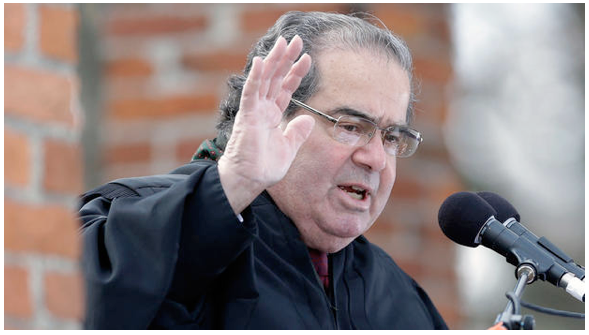CommentsPERSPECTIVE--The death of Justice Antonin Scalia ends, at least for now, the 40-year conservative majority on the U.S. Supreme Court. That majority began with justices chosen by President Nixon, and his picks ended a liberal majority that also went back four decades to President Roosevelt. So Scalia’s death has a profound impact on the court, and on several cases that directly affect California.
The most important is Friedrichs v California Teachers Association. This case has been argued and a five to four majority was almost certainly ready to reverse a 1970s case called Abood v. Detroit Board of Education. Doing so would have prohibited public employee unions from forcing non-members to pay “fair share” dues. That would have decimated the CTA’s ability to raise political money from non-member teachers.
Even if the opinion was written and the five conservative justices had signed off on it, it almost certainly will not be issued because with Scalia’s death there are no longer five justices for overturningAbood. That means Abood remains in effect and the teachers need not fear limits on their ability to collect “fair share” dues. Democrats, who get the lion’s share of CTA money, are the big winners ifAbood is not overturned.
A second major case that had been argued and no doubt an opinion prepared is called Evenwel v Abbott. It would change the method of redistricting legislative districts to allow districting on the basis of eligible voters. Now this will not happen. There are certainly not five votes for changing redistricting as the four liberal justices made clear at oral argument they wanted no change. Republicans, especially in California and Texas, would probably have gained if districts were based on voters rather than total population.
An interesting issue would arise if both of these opinions were ready for issuing next week, and Scalia had signed off on them. Would the Chief Justice try to ram them through without the fifth vote being there? Probably not, but it is a possibility.
But not all the impacts of losing Scalia are so clear cut. Fisher v. University of Texas has been back and forth to the court several times. The conservatives have wanted to declare affirmative action in higher education illegal, and may have had the votes to do so. But this case has an interesting twist; liberal Justice Elena Kagan has recused herself, and the case could be decided on a four to three ruling by the remaining justices.
Some Democrats in California want to repeal Proposition 209, a 1996 measure banning higher education affirmative action here, via a ballot measure. What looked like a five to three ruling that affirmative action is unconstitutional may still be issued, but by a four to three majority, so Scalia’s death does not change things here.
Finally there is the immigration case, Texas v. United States, which challenges President Obama’s plan to legalize five million illegal aliens, many of whom live in California. His plans were put on hold by the 5th Circuit Court of Appeals, and the Administration appealed to the Supreme Court.
Scalia’s death changes the equation in an interesting way. There was some reason to believe the court planned not only to rule against Obama but to slap him down for not “faithfully executing” the laws of the country, as the Constitution requires. That will not happen now; the most likely result is a four to four tie that leaves the 5th Circuit opinion in place. But the Administration could still win if swing Justice Anthony Kennedy were to agree with the liberals that the president has not exceeded his powers in legalizing the immigrants.
Scalia’s death has a major institutional impact on the court; Justice Kennedy is no longer the “decider”, the fifth vote for a conservative outcome. There are no longer four conservatives. He would only be the fifth vote if he were to decide with the four liberals, which he did on some cases in 2014.
The long time conservative majority on the California Supreme Court has disappeared because of three appointees of Gov. Jerry Brown that shifted the ideological balance. That is likely now to happen to the U.S. Supreme Court. For conservatives to regain control of the Supreme Court they would need to elect a Republican president in 2016, as well as holding the U.S. Senate, a necessary step to get a conservative justice confirmed.
But Donald Trump, the prospective Republican nominee, launches one kamikaze attack after another against his own party, this making the election of Hillary Clinton that much more likely. Were Mrs. Clinton’s to win this November, her administration will be transformational from the first day, as she will permanently end the 40-year conservative majority on the U.S. Supreme Court.
(Tony Quinn is a political commentator and former legislative staffer. This column was first posted at foxandhoundsdaily.com)
–cw
















